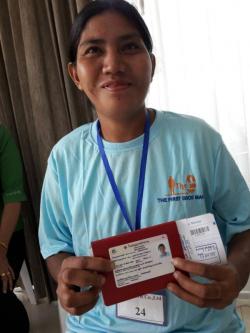Thailand: E-work permit smart cards get roll-out
The Labour Ministry has begun issuing e-work permit smart cards to migrant workers to make it easier for officials to verify the workers’ information and stamp out falsified documents.
According to ministry officials, the cards will be easier to carry and hard to falsify. It would also be more convenient for officials to check the workers’ information by using their smart phones to read the QR code embedded in the cards.
The card features a photo and contains the profile of the migrant worker as well as information of his or her employer and workplace, according to officials. The QR code, meanwhile, contains related information, including immigration records of their departures and arrivals in the country as well as any change of employer. The cards were first issued at the Post- Arrival and Reintegration Centre for Migrant Workers in Mae Sot district of Tak. They were distributed to newly-arrived migrant workers under a memorandum of understanding (MoU) requiring joint supervision of the workers’ employment contracts between Thai authorities and the workers’ countries of origin.
Labour Minister Sirichai Distakul recently visited the Mae Sot centre to follow up on the process of issuing e-work permits. He also witnessed the process of delivering the permits to alien workers there.
It is one of three centres set up under the cabinet resolution in July last year to tackle the human trafficking problem. The centres also provide training and education courses for newly-arrived migrant workers on issues related to their living conditions in Thailand, the law, their work contracts and Thai culture and traditions.
More than 100,000 migrant workers have undergone training at the centres.
Varanon Peetiwan, director-general of the Department of Employment, said the e-work permit is a pilot project carried out at the Mae Sot centre for the first time. The documents will be issued at other border centres in Nong Khai and Sa Kaeo next month.
Under the MoU, Mr Varanon said Thai employers need to draw up clear terms and conditions for employing migrant workers, subject to approval by officials in Thailand and the workers’ respective countries, to ensure fair employment obligations.
After that, employers have to present the contract documents to the centre, where they would later pick up their workers.
Mr Varanon said the e-work permits would be valid for two years, on par with the maximum length of employment contracts. If employers need their workers to work longer, they are required to apply for a new permit, while employees can extend their permits using their e-work permit smart cards.
As for migrant workers already working in Thailand, they must return to their countries of origin when their work permits expire.
If they want to re-enter Thailand to work, they need to have passports and secure the e-work permits to work under the MoU system.
“The workers who entered the country under the MoU system with the passports will find it convenient as they can present themselves as people who entered the country legally in line with their work contracts,” Mr Varanon said.
At the Mae Sot centre, Pyone Pyone Yi, a 23-year-old Myanmar worker, was delighted to obtain her e-permit card, which she said is easy to carry around in her purse.
The conventional work permit comes in the form of a booklet.
She said this new system gives her the confidence that she will have a legal job which will allow her to send money back home.
Source: http://www.bangkokpost.com/business/news/1237254/e-work-permit-smart-cards-get-roll-out


 Thailand
Thailand




